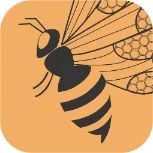Comprehensive Detailed Guide about Carob Honey
Honey is a tasty, magical substance produced only by the honey bees but enjoyed worldwide. We have all hailed this natural sweetener's benefits for thousands of years. Available in various flavors, colors, and aromas, honey is mainly a bundle of beneficial nutritional compounds. When searching for different honey varieties, Carob honey is unique among them.
Table Of Contents

- What is Carob Honey?
- About the Carob Tree
- Characteristics of Carob Honey
- How is Carob Honey Made?
- What are the Benefits of Carob Honey?
- Best Ways to Use Carob Honey
- Is Carob Honey Vegan?
- When Should You Avoid Consumption of Carob Honey?
- What are the Potential Risks of Consuming Carob Honey?
- Takeaway
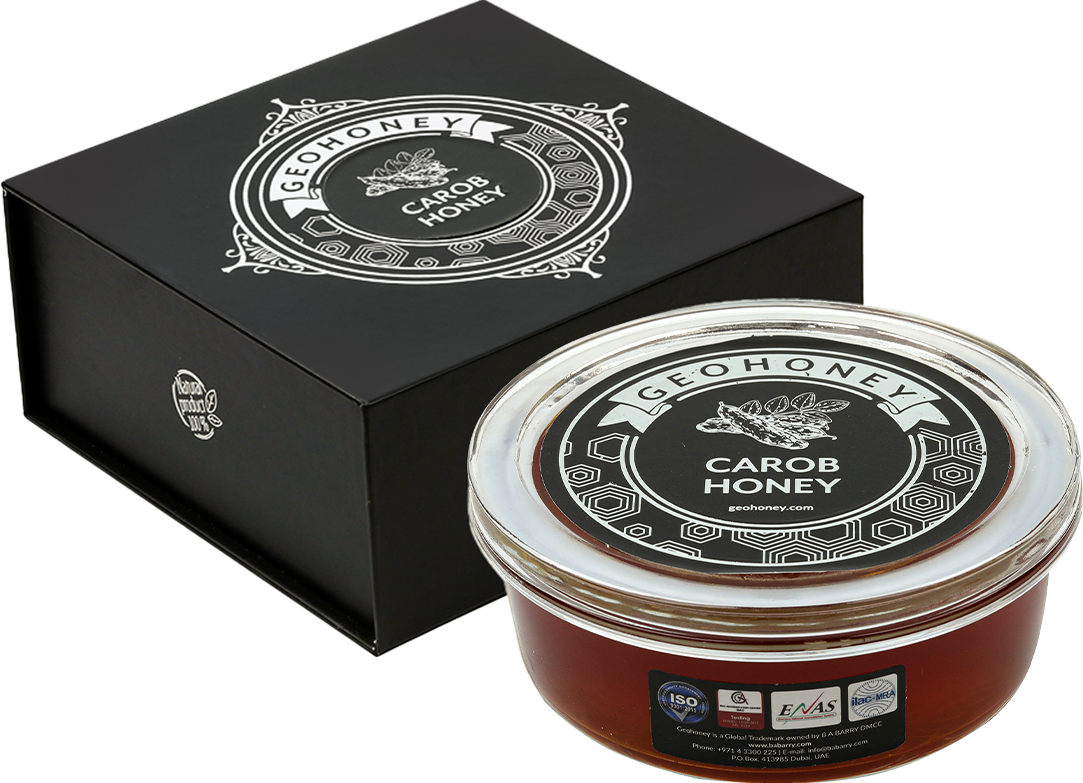
What is Carob Honey?
Carob honey is a monofloral honey variety made from the nectar found in abundance on the carob tree flowers. It is a rare honey variety and is produced by commercial carob tree farming. It has many antioxidants and minerals and possesses solid antibacterial properties.
Although this honey comes from the flower nectar, it shares similar characteristics with the carob fruit pod. Therefore, we can say that carob is the king of all kinds of honey, due to its exceptional benefits and rich chocolaty taste.
About the Carob Tree
Carob is a small flowering tree that belongs to the legume family. Ancient Greek people were the first to grow carob trees, which are now grown worldwide. Each tree is single-sex and takes both male & female trees to produce carob pods as a single male carob tree can pollinate up to 20 female trees. Once the female tree gets fertilized, it starts producing numerous dark brown pods filled with brown pulp and tiny seeds. These carob pods are 1/2 to 1 foot in length and about 1 inch wide.
This tree has been known for at least 4000 years. They bloom in pre-winter, and the blossoms are in large numbers, green-tinted red, small-sized, 6-12 mm long, spirally organized along the inflorescence axis in catkin-like racemes borne on spikes from old wood and, surprisingly, on the trunk.

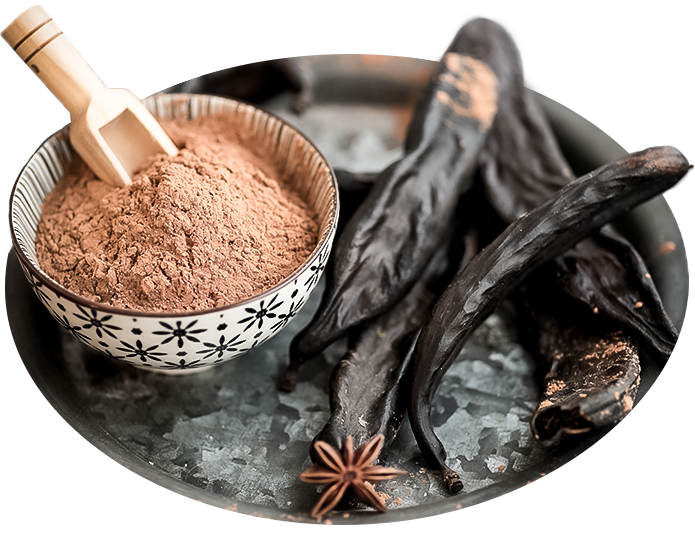
Characteristics of Carob Honey
Monofloral carob honey comes in yellowish-brown color and has a soft coarse texture. This delicious honey variety has a warm sweet/sour taste and a medium intense aroma. It is uniquely infused with chocolate and herbal overtones and a slightly bitter aftertaste. As it lacks caffeine and has less fat than chocolate, people often use it as a healthy substitute.
How is Carob Honey Made?
The production of carob honey is a multi-step process. First, worker bees collect the nectar from carob flowers using their proboscis by visiting hundreds of flowers on one foraging trip. This nectar collected by the worker bees is stored with honey bee saliva in a special sac called their honey stomach. When their stomachs are completely filled, these worker bees return to the hive and pass the nectar to the waiting bees to start the honey-making process.
This nectar is chewed, mixed with bee enzyme, and passed from bee to bee. During this process, enzymes change the pH and other chemical properties of the nectar. While passing on the nectar from bee to bee, some water is removed from the honey, but a few more steps are required to dry out the water content completely.
This process is repeated fewer times, and eventually, the water content of honey is reduced to about 17-20% from a whopping 70%. At last, the honey bees finally store this honey into the honeycomb cells, where it is kept until bees are ready to eat it.
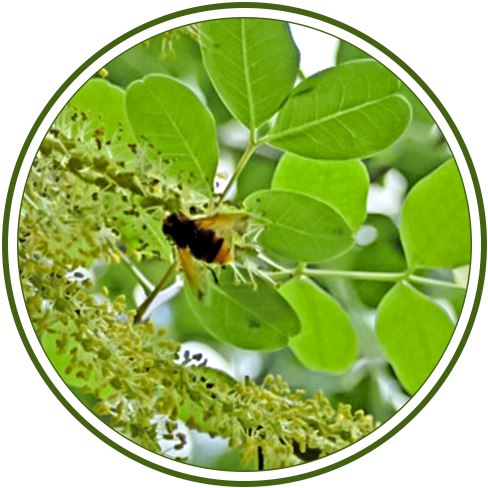
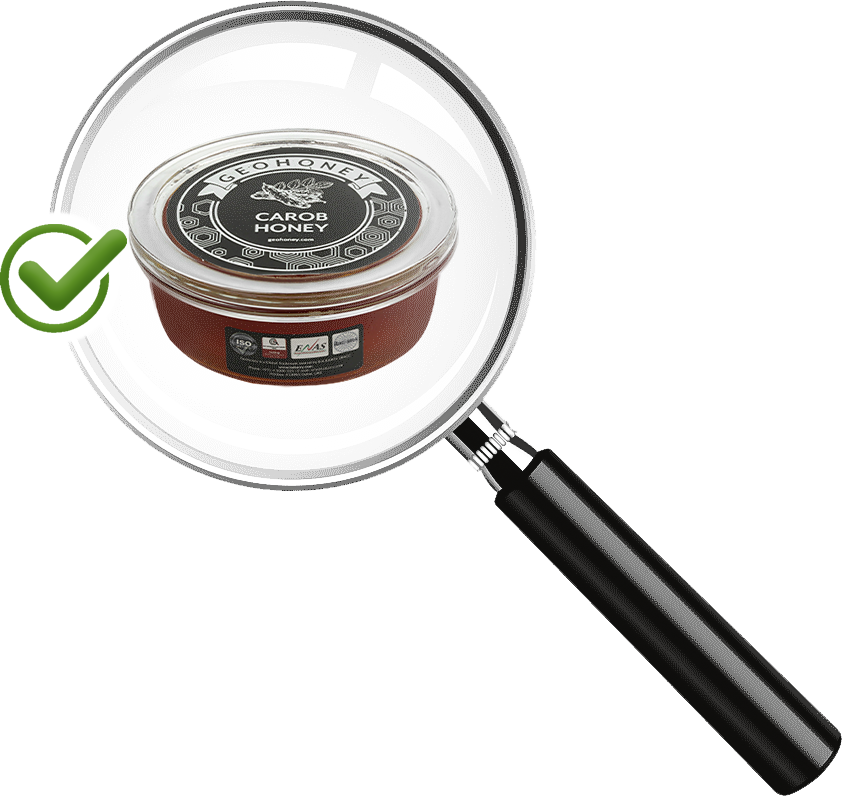
What are the Benefits of Carob Honey?
The carob honey properties are common to all honey due to low humidity, acidity, and enzyme content. Thus, the carob honey benefits are the same as other honey varieties.
-
Eases Throat Infections
Carob honey is an old home remedy used for curing throat infections. It is good to add it in warm water or consume a teaspoonful of it in the morning to relieve the sore throat.
-
Helps in Digestive Issues
Carob honey is used to treat stomach-related issues like diarrhea; however, there isn't a lot of exploration to show that it works. It's demonstrated to be powerful as a treatment for Helicobacter pylori (H. pylori) bacteria, though a common cause of stomach ulcers. It is also a powerful prebiotic, meaning it feeds the good microbes that live in the digestive tracts, which are crucial for digestion and general well-being.
-
Assist in Healing Wounds
Carob honey is used in medical settings to treat wounds since it has been viewed as a successful germ killer and aids in tissue regeneration. Studies show that it can help to heal time and reduce infection. Remember that the honey used in hospitals is a clinical grade, meaning it's inspected and sterile. It is always advised to apply only raw honey to wounds. It helps fast heal burns, cuts, and wounds without leaving scars.
-
Acts as a Perfect Natural Aid for Better Sleep
For all those who have trouble sleeping, drinking warm milk mixed with carob honey before bedtime is an excellent way to induce better sleep.
-
Assists with Gum Issues
Honey's antibacterial and infection mending properties help treat and recuperate wounds. Teeth and gum illnesses like gum disease, bleeding, and plaque can be treated to an extraordinary degree with the regular use of honey. Honey is known to deliver antiseptic hydrogen peroxide, which is hostile to microbial specialists and forestalls the development of microorganisms. Specialists recommend using raw honey blended in with water to be used as a mouthwash. Also, rubbing honey directly on impacted gums gives instant relief from pain, inflammation, and other periodontal diseases.
-
Natural Energy Booster
Carob honey is known as a fantastic wellspring of usual energy as the natural sugar present in it enters the circulatory system directly, thus giving a speedy increase in energy. This quick boost in energy works like a miracle for your exercise, particularly in more extended endurance exercises.
-
Prevents & Helps Control Skin Issues
Dermatitis is a skin condition that causes red, itchy, flaky skin that causes inconvenience. Typically, kids and young people experience the ill effects of skin inflammation that can be treated with honey. To get relief from such conditions, it is good to combine raw honey and olive oil and apply on the skin to dispose of the issue. Carob honey goes about as a characteristic cleanser by eliminating dirt and making the skin smooth and delicate. It can also be used to scrub the skin by blending it in with oats to eliminate dead cells. Regular use of honey keeps skin inflammation from occurring or coming back again
Best Ways to Use Carob Honey
Consuming two spoons of carob honey a day can offer beneficial effects on your daily diet. It can be used as an excellent substitute for other sweeteners like sugar and other additives. It goes well with a daily breakfast meal and enhances the taste of the dish you add it to. It combines perfectly with sweet/sour flavors and is best used in all pastry recipes like cakes, ice creams, etc. One can also enjoy using it as a sweetener in hot/cold drinks.
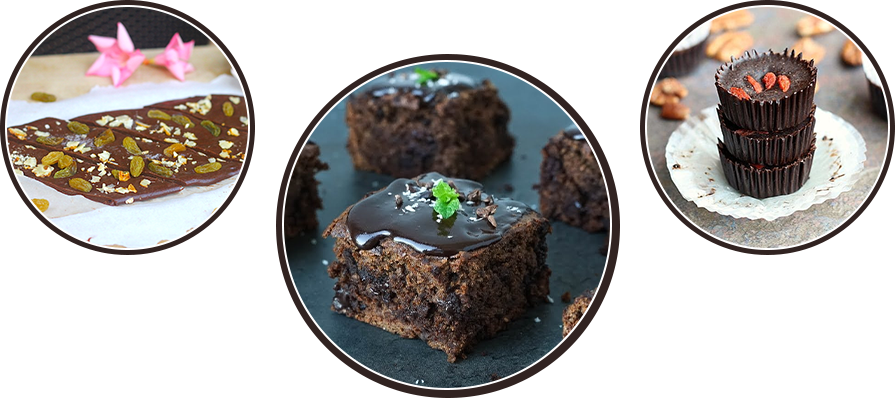

Is Carob Honey Vegan?
Most of the vegan people don't consider carob honey vegan. As bees make it, vegans avoid consuming products made by insects/animals. Many vegan people consider bee farming the same as animal farming. Beekeepers usually employ unethical practices to optimize profits, and such practices are considered unethical by the vegan standards.
These include cut-out the wings of queen honey bees to keep them from escaping the hive, supplanting collected honey with healthfully inferior sugar syrups, and killing whole bee colonies to forestall the spread of infection, rather than giving them medication.
Veggie lovers pick to stand firm against these manipulative practices by avoiding honey and other honey bee items, including honeycomb, bee pollen, honey bee dust, royal jelly, or propolis
When Should You Avoid Consumption of Carob Honey?
Even though carob honey is produced using the nectar of beautiful carob flowers as the essential source ingredient, it may contain pollen particles. Thus, people who are hypersensitive or have any allergic issues to flower pollens should always avoid the consumption of carob honey.
It is suggested not to offer carob honey to babies below 1-year age because of the likely presence of botulism spores. As babies' immune system is not so strong, consumption of honey can cause a severe problem called infant botulism. In addition, these botulism spores might be contagious, and thus it is also recommended that pregnant ladies and ladies breastfeeding should not consume them.
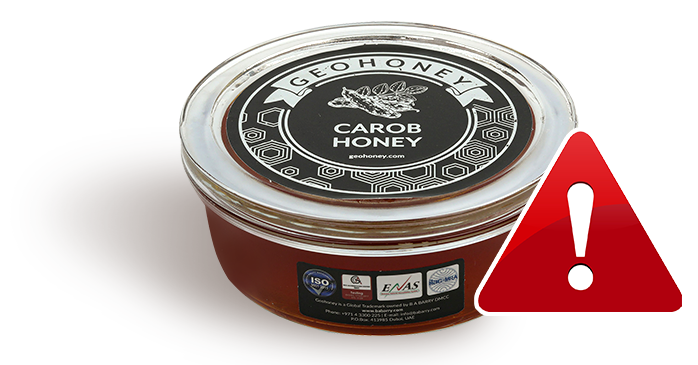
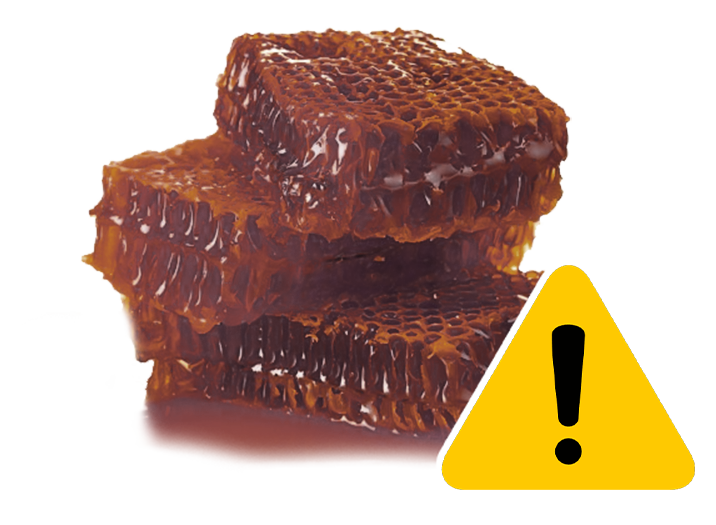
What are the Potential Risks of Consuming Carob Honey?
- Carob honey should always be consumed in appropriate quantities, as excess consumption may lead to severe issues.
- People who are oversensitive to bees and bee pollen can experience allergic reactions due to the consumption of honey.
- Pregnant ladies and diabetic people should always consume it after consulting the specialists as it can harm the baby and increase sugar levels in individual cases.
Takeaway
As a purely natural food item, carob honey can be enjoyed by drizzling it over desserts, adding to tea as a sugar replacement, or using it in a baking recipe. We should all thank the little honey bees for their fantastic contribution to our food supply and the delicious honey they produce. Express your gratitude towards these tiny creatures by buying raw carob honey and other bee-based products directly from Geohoney, who focuses on regenerative principles and honeybee health. Your kind step will help significantly support the relationship between bees, beekeepers, and the communities they serve!

BUY OUR CAROB HONEY
What’s the buzz, Join the hive !
SIGN UP TO OUR NEWSLETTER
Be the first to know about our hot deals, new arrivals.



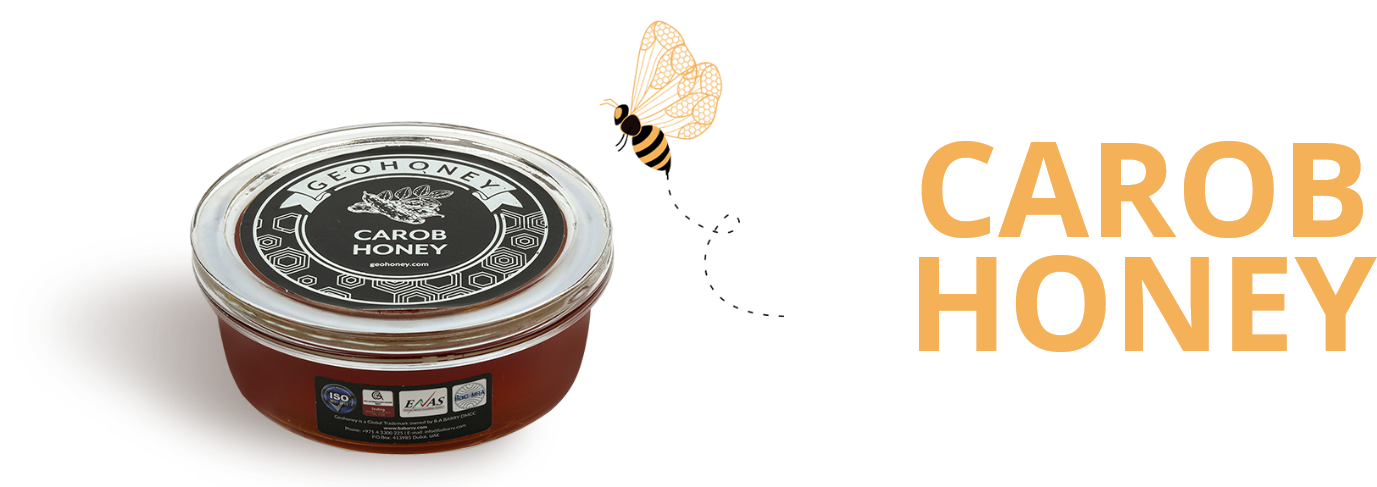

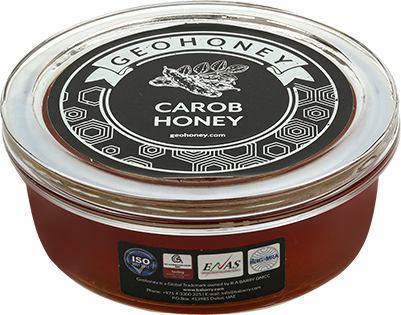


 Pay By Cards
Pay By Cards
 PayPal
PayPal
 Stripe
Stripe
 Other Payment Methods
Other Payment Methods







